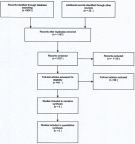HIV prevention cascade theory and its relation to social dimensions of health: a case for Nigeria
- PMID: 31686918
- PMCID: PMC6709786
- DOI: 10.2147/HIV.S210190
HIV prevention cascade theory and its relation to social dimensions of health: a case for Nigeria
Abstract
Background: Nigeria has the second largest HIV epidemic in the world and one of the highest rates of new infection in sub-Saharan Africa. Within the last three decades, majority of HIV programs in Nigeria were treatment strategies with few prevention approaches. The persistence of HIV prevalence despite the treatment blueprint has led to a concerted call to HIV Prevention Cascade (HPC) theory which ensures continuous sophisticated interrelationship that stretches beyond the biomedical interventions of treatment. To our knowledge, there is no previous review on HPC theory in Nigerian context.
Objectives: The aim of this review was to explore and outline the HIV/AIDS prevention cascade theory in relation to the achievement of the global 90-90-90 target set by the United Nations Programme on HIV and AIDS and suggest possible avenues to maximize on strengths and weaknesses of HPC in Nigeria.
Methods: In this mini-review, the authors utilized standardized search measures in the review of published articles in credible domains across the HPC in PubMed, Research gate, Google Scholar, Mendeley Reference Manager and Cochrane Library from January 1980 to December 2018. Referenced sections of the articles identified were used to hand-search additional references not retrieved by the initial search engines. The authors performed an evaluation of selected studies on three cascade theories: epidemiological, behavioral and social science with an integration of the supply, demand and adherence sides.
Results: We included nine review articles reporting three different cascade theories. Only one included study applied the cascade theories exclusively in Nigerian context. We could only conduct narrative synthesis.
Conclusion: There is scarceness of currently published evidence on HPC in Nigerian context. HPC allows for a paradigm shift and sequential process of events to eliminate the epidemic of HIV using HIV prevention perspectives in Nigerian settings. Since data are sparse, more research is needed on HPC theory.
Keywords: HIV; HPC; Nigeria; cascade theory; epidemic; prevention; social dimensions.
© 2019 Joe-Ikechebelu et al.
Conflict of interest statement
The authors report no conflicts of interest in this work.
Figures
References
-
- NACA. National Strategic Framework on HIV and AIDS: 2017; 2017–2021. Available from: https://naca.gov.ng/national-guidelines-hiv-prevention-treatment-care-2/. Accessed January3, 2019.
-
- NACA. Nigeria GARPR 2015, 2015. Available from: https://naca.gov.ng/nigeria_garpr_2015_report/. Accessed January3, 2019
-
- Bain LE, Nkoke C, Noubiap JJN. UNAIDS 90- 90-90 targets to end the AIDS epidemic by 2020 are not realistic: comment on “Can the UNAIDS 90- 90-90 target be achieved? A systematic analysis of national HIV treatment cascades”. BMJ Glob Health. 2017;2(2):e000227. doi: 10.1136/bmjgh-2016-000227 - DOI - PMC - PubMed
-
- UNAIDS. Combination HIV Prevention: Tailoring and coordinating Biomedical, behavioural and Structural Strategies to reduce New HIV infections. 2010. A UNAIDS discussion Paper. Available from: www.unaids.org.
LinkOut - more resources
Full Text Sources
Miscellaneous


